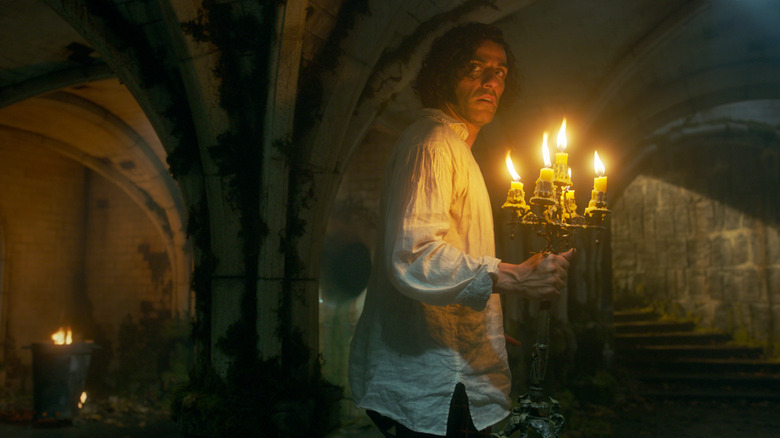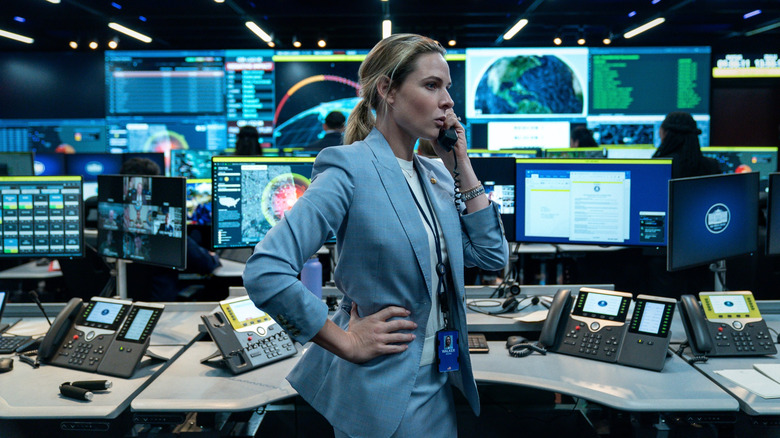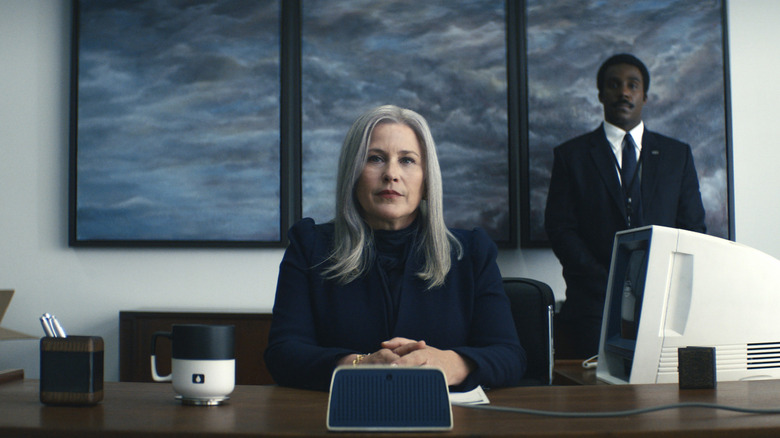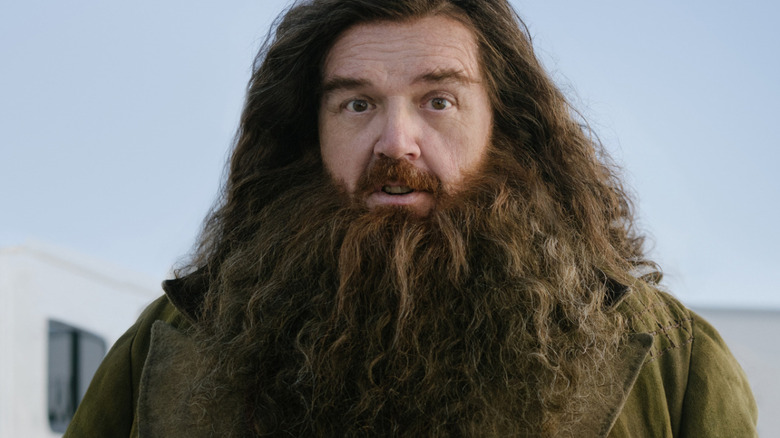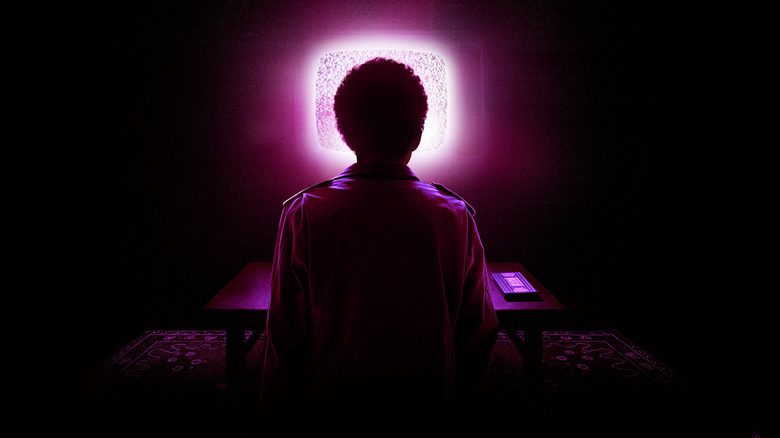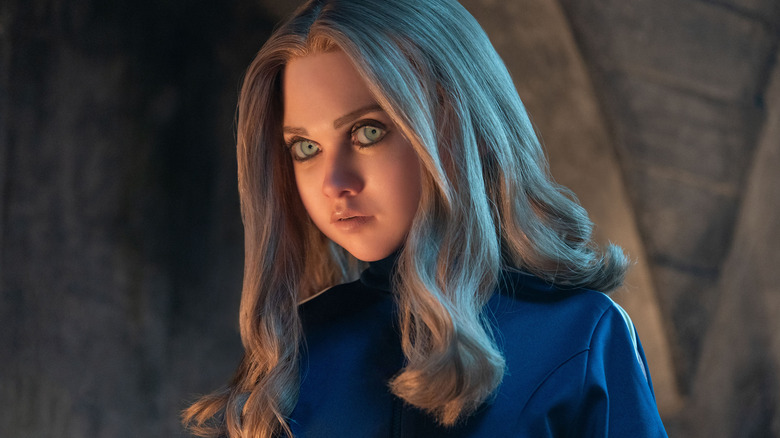5 Scariest Movie Trends Keeping Us Awake This Spooky Season
Mysterious things going bump in the night, social media feeds filled with that opening narration of "The Batman" set on Halloween, horror fans cracking open their favorite classics for movie night — that's right, it's officially Spooky Season™ and the holiday has us feeling a little introspective about the state of cinema these days. From a pure entertainment standpoint, 2025 has certainly delivered the goods in terms of horror films and shows. "Sinners," "Weapons," "The Long Walk," "28 Years Later," and "It: Welcome to Derry" (to name just a few) are almost guaranteed to be staples on many an end-of-year list during the months ahead. Plus, Halloween typically feels like a barometer for what actually breaks through our echo chambers and translates to pop culture at large, which is why we can expect to see plenty of people in Bob Ferguson costumes from "One Battle After Another" roaming the streets. What's not to love?
Yet, despite all the festivities and cause for celebration, we can't help but feel a little concerned about where we seem to be headed. Horror as a genre can actually represent some of the most hopeful and romantic narratives you'll find; Guillermo del Toro has made a living out of it, after all, with his upcoming gothic film "Frankenstein" appearing to be no exception. With that said, there's also the other side of the coin to consider and all the red flags that come with that. We're ensconced in a filmmaking landscape full of concerning trends for us to grapple with ... and no simple solutions for a quick fix. It may be the best time of the year for the scariest movies, but here are the real horrors staring the film industry right in the face.
The studio system is still on life support
You know all those doom-and-gloom naysayers we occasionally run into, crowing about how there's nothing original to watch and how Hollywood's running out of ideas ... despite them only ever watching a grand total of five movies a year in theaters? They may be the worst possible messengers for the point they're trying to make, but there is a nugget of truth buried underneath those hysterics. For regular readers of /Film, the following isn't anything new. While it's easy to point to the pandemic as the cause of all our current ills, the reality is that the studio system has shown signs of rot for quite some time now. Moviegoing trends have been firmly pointing down for decades, leaving theaters and theater owners desperate to find anything to bring people back. In response, the powers that be have pushed their chips all the way in, gambling everything on spectacle and event-sized blockbusters instead of giving audiences a wide range of diverse offerings to choose from.
What's so bad about that? Look no further than the widespread disappearance of mid-budget movies, long considered a crucial lifeblood of the industry and traditionally a safe haven for adult-minded dramas (along with the movie stars that led them). Without that once-reliable natural resource, filmmakers like Guillermo del Toro and Kathryn Bigelow and Martin Scorsese have been forced to take their talents to streamers — thus cutting out theaters altogether and mitigating the risk of almost inevitable box office losses. When it's a choice between either a straight-to-Netflix project or not getting a movie made at all, well, it's understandable why Rian Johnson or Greta Gerwig would opt for the former.
That's no less troubling for our purposes, however, and an unsettling sign of things to come.
The movie business is downsizing at an alarming rate
It's almost like there's a reason why audiences responded so strongly to the corporate satire and gross worker exploitation sprinkled throughout Apple TV's "Severance." The nightmarish efficiency of Lumon Industries was meant to be an obvious, exaggerated spoof on modern society grinding us into pieces beneath the wheel of commerce. But that barely even registers as hyperbole in an era where AI companies are giddily advertising the replacement of human beings in major cities. (More on that later.) Compared to the antics of Warner Bros. Discovery's David Zaslav, is the cartoonish villainy of Tramell Tillman's middle manager Mr. Milchick or Britt Lower's CEO Helena Eagan really all that ridiculous?
The fictionalized evils of "Severance" only slightly outmatch the self-destruction of the actual film industry, as studios continue to put up "For Sale" signs and downsize at an alarming rate. We already endured the devastating merger between 20th Century Fox and Disney, a move that singlehandedly removed an entire legacy studio overnight and cost thousands of people their livelihoods. Now, we're in for a redux that nobody asked for as WBD courts potential buyers like Paramount or, most disturbingly, Netflix (as reported by Reuters). The human cost of such unchecked consolidation and power-grabbing is awful enough. But in terms of the economics of it all, a dwindling series of places for writers and directors to sell their stories is bad news all around. That means fewer movies, even less opportunity for the most marginalized talent, and an unhealthy climate where a mere handful of studio executives hold all the money and power.
Most of us already have plenty of scares to keep us up at night, but feel free to add this one to the ever-growing list.
More and more franchises are stuck in purgatory
What's spookier than all the ghouls, gremlins, and goblins combined? How about a world where we're force-fed a conveyor belt of all the same stories from the same properties over and over and over again? To be entirely fair, critics have been sounding the alarm bells for this phenomenon ever since blockbusters were first invented. You better believe there were a contingent of dissenters who looked at George Lucas' original "Star Wars" or Steven Spielberg's "Jaws" as a worrying signifier of the death of motion pictures as an art form. The difference now is that those sky-is-falling predictions genuinely feel more real than ever.
Even the biggest fans of the world's most popular franchises would agree that it's becoming far too tempting to dismiss entire movies and shows as "slop." Set aside obvious targets like Universal's attempt at a Dark Universe (may it forever rest in peace) or Sony's disastrous Spider-Man spin-off movies. As much as I'll defend certain productions, the aura and mystique of "Star Wars" is inevitably dimmed by the existence of far too many entries that just aren't up to snuff. More recently, a beloved horror series like "Scream" and its fan-favorite lead simply can't be allowed to rest, even when its seventh installment looks more generic and uninspired than ever. And don't even get me started on HBO's "Harry Potter" adaptation, which feels like the most pointless and transparently money-grubbing brand extension in quite some time.
Look, we're not exactly stepping out on a ledge to say this. You can tell a lot about any industry by what makes (or costs) the most amount of money. Based on the available evidence, there are very few promising signs that the best days for Hollywood IPs remain ahead of us.
The streaming experience is worse than ever
What do we want? A return to cable! When do we want it? Yesterday! It's no secret that mistakes may have been made when we decided to follow industry leaders off a cliff like dutiful little lemmings and collectively cut the cord in favor of streaming. Don't get me wrong: There was plenty of reason to be hopeful that this was the next big thing. A subscription-based model where we could choose what to watch, when to watch it, and all for a relatively low monthly price with zero commercial breaks? If that sounded too good to be true, well, that's because it was.
It's safe to say that the wide-eyed appeal of being a streaming customer has soured faster than milk left outside to spoil. Need we run through the same old list of everything that's gone wrong and ultimately spelled the death of the streaming dream? There are the endless price hikes sprung on us from all corners on a seemingly routine basis, implicitly confirming that this business wasn't exactly as profitable as investors and CEOs touted once upon a time. There's the actual quality of what's beamed to our devices, digitally compressed and crushed until images no longer resemble anything close to what artists originally intended. And who can forget the joys of having to keep track of the revolving door of movies and shows on each platform, added or taken away at the drop of a hat — sometimes permanently and with no warning whatsoever, leaving ad-supported services such as Tubi to embrace the "Looney Tunes" and pick up Warner Bros.' slack. There's no putting the genie back in the bottle, so streaming is here to stay ... but here's hoping it evolves.
The AI bubble is bound to pop -- but at what cost?
For proponents of AI, the newfangled tech is here to stay. For those of us staunchly opposed, it's perhaps the most existential threat creatives have ever faced. But what we should be asking isn't whether this bubble is doomed to pop, but what happens when it inevitably does ... and who pays the biggest cost as a result. Compared to every other item on this list, nothing feels quite as ominous or industry-breaking as this one. AI companies and their shareholders have jumped headlong into this craze like prospectors during the Gold Rush, albeit with far less guarantee of ever actually seeing a return on investment.
There's no shortage of reasons to keep a skeptical eye on this trend, even beyond its effect on movies and entertainment. To date, all the talk about the benefits of AI have been nothing but speculation: an opportunity to cut costs, the potential to maximize profits, the chance to revolutionize the way we perceive the world around us. Is any of that actually guaranteed to happen? Your guess is as good as theirs. What's clear is that all these so-called advantages are really only from an AI company CEO's perspective, since those terms mostly boil down to an excuse to stop paying humans fair wages and pocket the money instead. (Assuming profits ever actually start to roll in.)
For the purposes of this article, however, art has undoubtedly suffered under AI and will continue to do so. Whether it be garish production design that sticks out like a sore thumb, controversial enhancements to star-driven performances, or voice actors contending with being replaced, no aspect of storytelling is safe. We can only hope the industry comes to its senses before it's too late.
